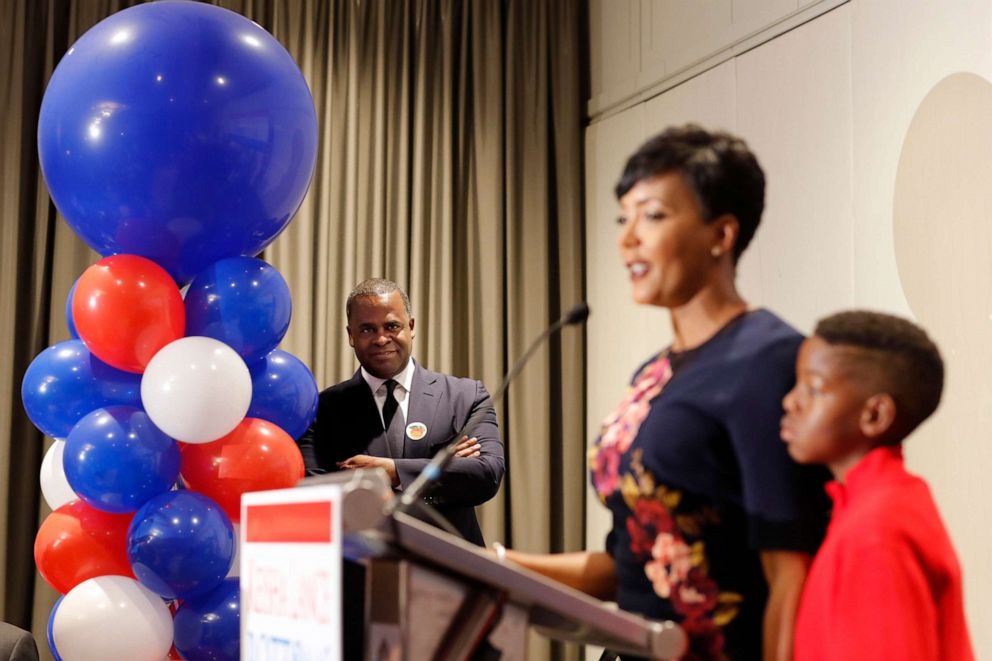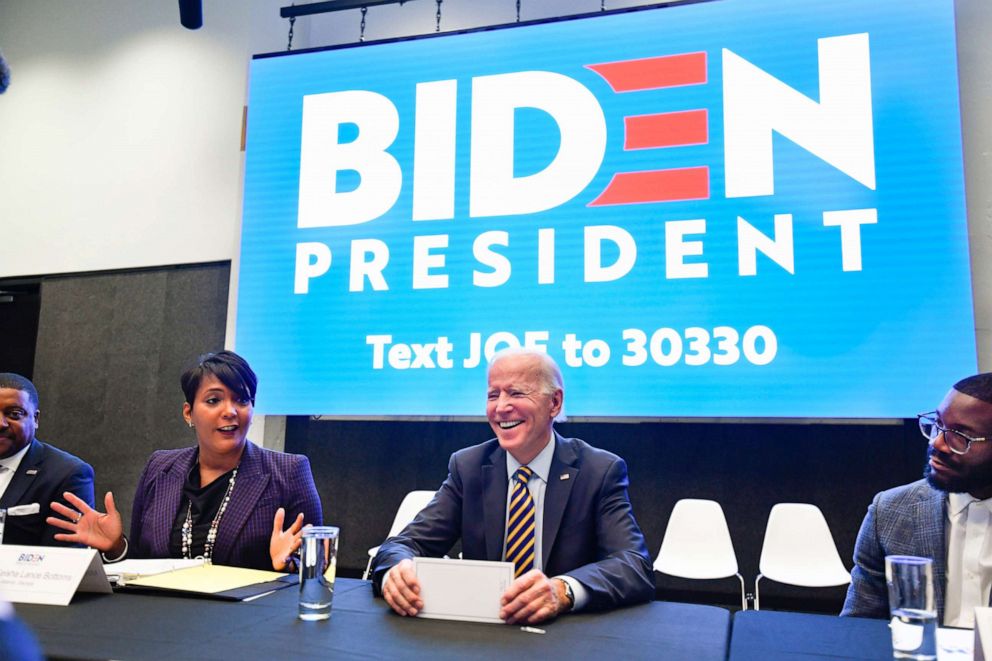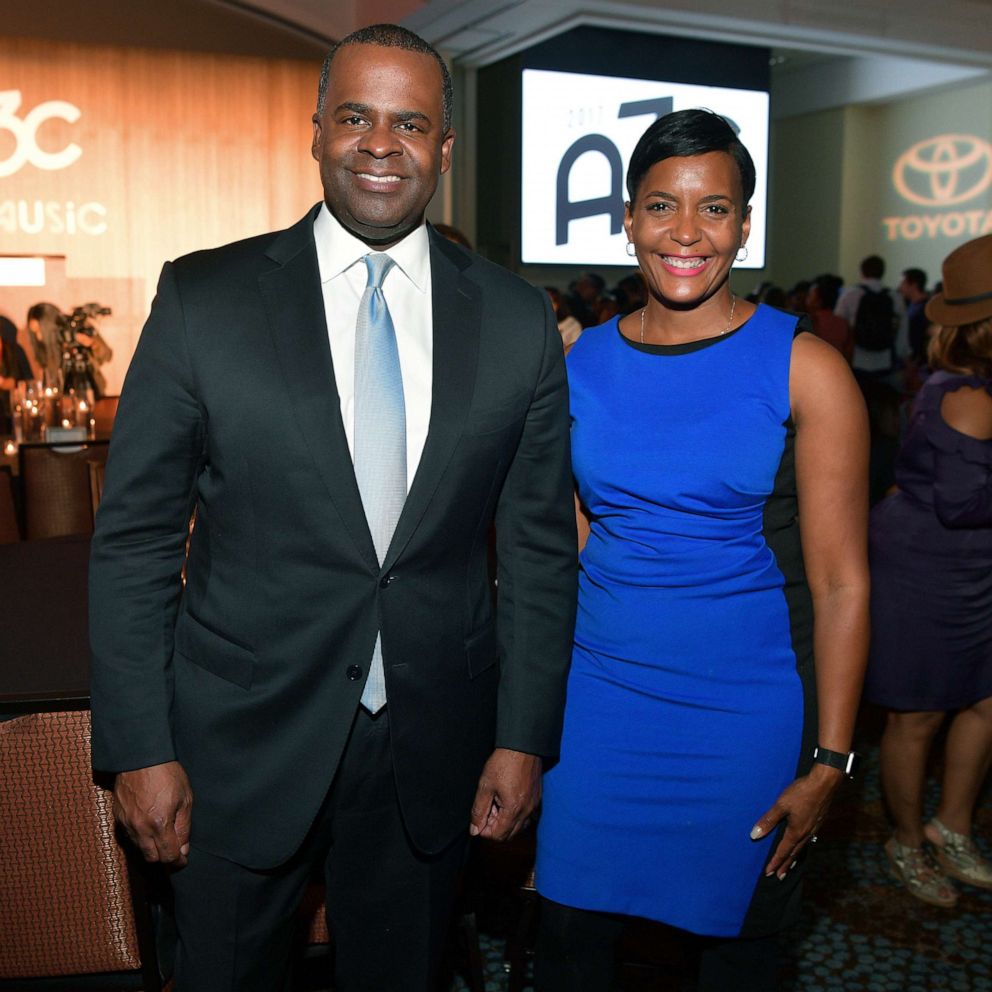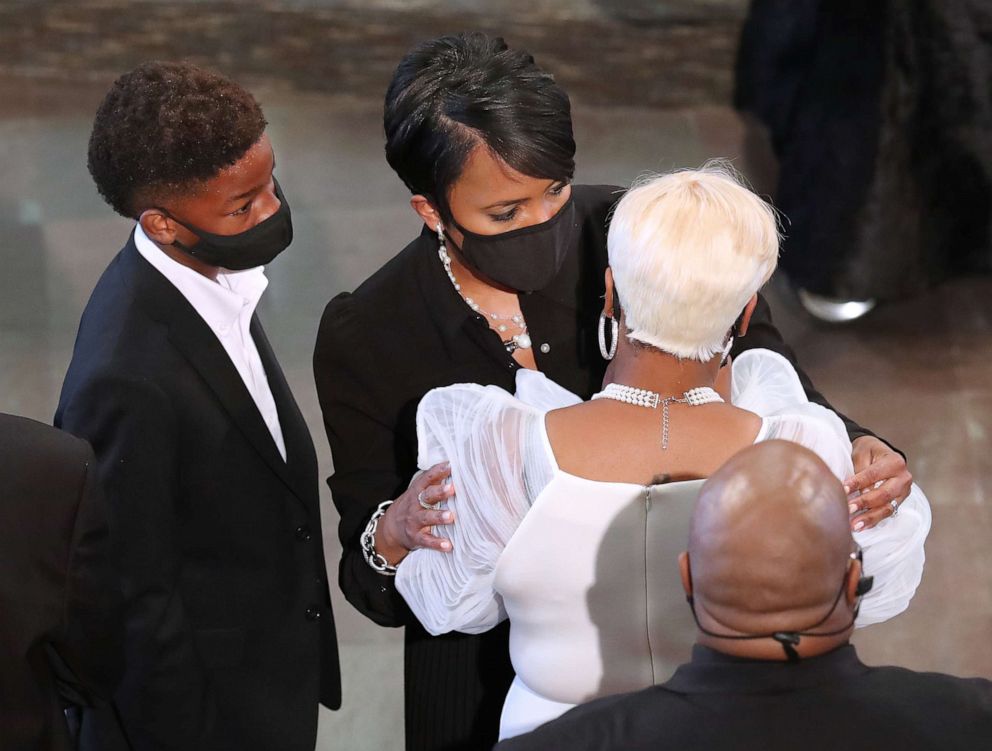Before VP whispers, Atlanta Mayor Keisha Lance Bottoms' rise propelled by controversial figure
Federal investigators uncovered pay-for-play scheme in previous administration.
Atlanta Mayor Keisha Lance Bottoms’ impassioned plea for calm as her city descended into “chaos” last month has helped catapult her onto Joe Biden’s list of possible running mates – a seamless, rapid, and for some, unexpected ascent to the national stage.
Still largely unknown outside of Georgia, Bottoms’ reputation locally has been shaped in part by close political ties to her predecessor, Kasim Reed, who left office in 2018 under the shadow of a federal corruption investigation.
That relationship helped propel Bottoms to city hall in 2017, according to several current and former city office-holders, but many of those officials now say it could also jeopardize her bid to join Biden on the Democratic ticket.
“The uncertainty of the federal investigation into corruption at city hall would be something I would not want to overlook if I were choosing a running mate,” said Harvey Newman, a professor emeritus of policy affairs at Georgia State University and a former informal advisor to past Atlanta mayors prior to Reed’s tenure. “I see it as a potential problem.”

Bottoms has not been linked to the federal probe. When asked whether she perceives her ties to Reed as a possible vulnerability in the vetting process, Bottoms’ office told ABC News that, with a recent positive coronavirus test, her “focus remains on the health of her family and serving the people of Atlanta.”
“She does not have the luxury of focusing on a job that she does not have,” they said. Reed declined to comment for this story.
Last summer Bottoms did address the issue, telling reporters, "I don't run away from having a close friendship for decades with Mayor Reed."
"But I'm my own person," she said at the Atlanta Pres Club in June of 2019. "Despite all I did to show I was my own person, I wasn't given credit for being my own person.”

Reed and Bottoms have known each other for decades. In 2010, when Reed was sworn into city hall, Bottoms was elected to the city council. The two are described as opposites, but eventually forged a bond through a shared vision for the city. Bottoms was an introvert – “really low-key,” is how Michael Julian Bond, a city councilman, described her.
“I don’t think she actively seeks the spotlight. But when she does have the cameras on her, she can rise to the occasion,” Bond added. “She is contemplative and likes to keep her own counsel.”
Reed, on the other hand, had a reputation as a showman – a natural leader whose charisma helped redefine the city’s political landscape over nearly a decade. His lifelong goal was to become Atlanta’s mayor, and he reveled in the limelight.
Despite their differences, the two Democrats came together while Bottoms served a majority-Black council district in the city’s southwest neighborhood during Reed’s tenure as mayor. A lawyer by training, Bottoms became a forceful advocate for Reed’s pro-business platform.
In 2015, Reed appointed her to the powerful position of running the Atlanta Fulton County Recreation Authority (AFCRA), which controls the Atlanta Zoo and State Farm Arena, home of the NBA’s Atlanta Hawks.
Bottoms accepted the role, but maintained her seat on city council, a decision that drew scrutiny. Critics took issue with her dual city salaries and sought to characterize the arrangement as a conflict of interest, as the two posts served separate constituencies.
“I thought that [Bottoms] was the beneficiary of a very strong-handed mayor who wanted to have his people in place in certain positions,” said former Fulton County Commissioner John Eaves.
At the time, Eaves objected to her appointment. But he now counts himself as a supporter of Bottoms, saying she has “done a great job” responding to the coronavirus crisis.
Michael Smith, a spokesperson for Bottoms, defended her decision to take on both roles in a statement to ABC News: “The Authority is a separate agency, and prior to acceptance of the position, the City Ethics office confirmed that it was permissible to accept the position, as long as then Councilmember Bottoms recused herself from any related votes, which she did.”

In January of 2017, Reed’s political fortunes changed when federal prosecutors filed their first charges against the CEO of an Atlanta-based construction company who later admitted to paying more than $1 million in bribes to city officials in exchange for lucrative contracts. Months later, Bottoms announced her candidacy to replace Reed and shortly thereafter resigned from the AFCRA. Two city council members, who asked not to be named, told ABC News Reed personally encouraged a tentative Bottoms to join the race.
As election day approached, and with a crowded field of 10 candidates vying for an edge, Reed withheld his endorsement. But political observers noted that while he had not yet officially backed Bottoms, his preference for her was clear given his intense criticism of nearly every other candidate. Michael Leo Owens, an Emory University professor, told a local radio station at the time that Reed’s scrutiny of the candidates was unusual.
“I wouldn’t call it over the top,” Owens said, “but it’s certainly high up there.”
Reed eventually made his support for Bottoms public, promising “to do everything I can to make sure this woman wins.” Invaluable to Bottoms was his fundraising prowess and access to major donors.
“Reed gave [Bottoms] entrée to fundraising support and business leadership,” Newman said. “That was crucial to her election…that was definitely key.”
In the weeks leading up to election day, Bottoms racked up a slew of high-dollar donations, largely from out-of-state vendors. She shrugged off criticism of accepting the influx of corporate cash, reportedly saying, “Contractors, like all citizens, have a right to give.” In the last month of the campaign, Bottoms raised more than double that of her closest opponent.
Bottoms’ corporate donors did generate some negative headlines. At one point, she returned $25,000 from a contractor who was tied up in the FBI’s corruption probe into the Reed administration. Bottoms drew additional scrutiny when a Texas-based CEO held a fundraiser for her campaign shortly after winning a contract from the AFCRA while it was still under her leadership.
After her election, there was a general consensus in Atlanta that Reed’s endorsement was a major turning point in the election. Newman said, “It’s to her credit that she emerged the victor, but she owes a good bit to [Reed’s] support.” Others perceived the impact of his endorsement in starker terms.
“She would not be mayor if not for Kasim Reed’s help,” said Vincent Fort, a former state senator and one of Bottoms’ mayoral opponents.
Critics suggested that Reed’s endorsement could come came at a price: unofficial influence with the incoming Bottoms administration. But any public influence Reed might have gained after Bottoms was sworn in quickly evaporated as the sprawling federal investigation continued to grow.
Since leaving office Reed has largely receded from public view. So far, investigators have filed charges against 10 people as part of a pay-for-play scheme, including several high-ranking officials in the Reed administration. Seven have pleaded guilty and six have been sentenced to prison.
“The kind of corruption that emanated from the Reed administration was unprecedented,” said Fort.
The U.S. Attorney’s Office declined to comment on whether Bottoms has been interviewed or investigated as part of the case. In a statement to ABC News, Bottoms’ office said she “has not been interviewed on the federal probe matter, nor does she have any reason to believe she would or should be, as this investigation is centered around the previous administration.”
Newman speculated at this late stage, nearly four years into the probe, that she would “probably not” be implicated, but warned that residual fallout from the probe could still harm her politically. And with a high-profile trial for one of Reed’s former top advisers slated to begin in the fall, some fear that embarrassing new information could emerge.
For his part, Reed has denied wrongdoing and has not been charged with a crime. But as investigators continue their work, the probe has been a distraction for Bottoms, according to Howard Shook, a longtime city councilman.
“She has had to live with questions about the drip, drip, drip of federal indictments stemming from the prior administration,” Shook said.
In Atlanta, Bottoms’ tenure as mayor has had mixed reviews. Some praised her leadership style and laid back approach to governing. Critics say she has few legislative accomplishments in more than two years in city hall.
Bottoms’ office, in its statement to ABC News, highlighted her work on affordable housing, ending cash bonds at the city detention center, severing the city’s ties with Immigration and Customs Enforcement, and secured 30% pay raises for police.
More recently, Bottoms has had to navigate the dual crises of COVID-19 and ongoing civil unrest. After the death of Rayshard Brooks at the hands of a city police officer, Atlanta emerged as an epicenter of the nationwide movement.

Shook, who represents a largely white district north of downtown, said that while few of his constituents voted for Bottoms, many have reached out with nods of approval in her handling of the unrest.
As a result of the lingering probe, Bottoms has sought to distance herself from Reed. But she has also stopped short of denouncing him. Ceasar Mitchell, the former city council president, said the investigation has forced her to walk a “tightrope.”
“She has shown, on the one hand, loyalty to that relationship,” Mitchell said. “But on the other hand, she took steps to at least try to convey to people that she was addressing some of the issues that obviously were being laid squarely at the prior administration’s doorstep.”
To that end, Bottoms has addressed corruption in city hall by creating an inspector general’s office meant to “root out misconduct and waste in a manner that is completely separate from any political influence,” according to a press release from the city.
But political observers agree that the distraction for Bottoms won’t let up until the investigation concludes. Last month, U.S. Attorney Byung J. “BJay” Pak told reporters that “there are activities that are planned in the upcoming months,” but also noted that he “expects things will come to a close soon.”




